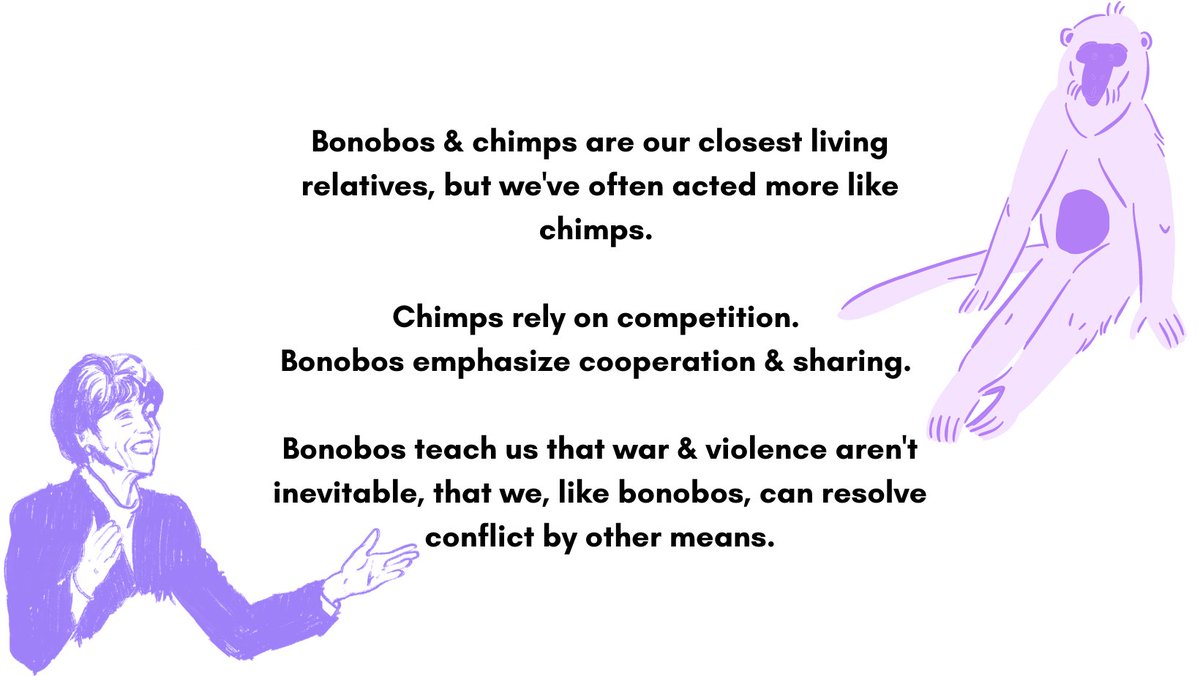Why, when we humans have such a great capacity for caring, consciousness, and creativity, has there been so much cruelty, insensitivity, and destructiveness? Has it ever been different, and can it be different again?
Let's look at some of our closest relatives, chimps and bonobos, to help answer this question.

Bonobos & chimps are our closest living relatives, but we've often acted more like chimps.
Chimps rely on competition. Bonobos emphasize cooperation & sharing.
Bonobos teach us that war & violence aren't inevitable, that we, like bonobos, can resolve conflict by other means.
In 2022, let's act more like bonobos.
To learn more about what humans can learn from bonobos, we invite you to read an exerpt from Riane Eisler's article on bonobos in the Interdisciplinary Journal of Partnership Studies below.
A Conversation with Sally Coxe: A Primate Partnership Culture by Riane Eisler
Sally Coxe: What fascinated me most was the contrast between bonobos (Pan paniscus) and our other closest relatives, the chimpanzees (Pan troglodytes). Whereas chimpanzee society is patriarchal, male-dominated, and competitive, bonobo society is matriarchal, peaceful, cooperative ,and more egalitarian. It orients more to what you have called a partnership rather than domination social system.
Chimps are the only primates other than humans that wage premeditated “wars” or conflicts with others of their own kind, usually over territory and natural resources—the same things most human wars are fought over. Bonobos, on the other hand, are the only primates other than humans that have sex not just for procreation, and do so with members of the same or opposite sex. Bonobos really do exemplify the 1960s credo, “Make Love, Not War!” So, in this way, bonobos and chimps represent the “yin and yang” of human nature, or the female and male paradigms.
Being a student of psychology and a hippie at heart myself, I found something I could believe in with bonobos.How could our own perception of what is “normal” change with knowledge of our bonobo heritage? Would bisexuality be considered natural, for example? What would our own culture look like if we emulated the bonobo side of ourselves, and learned to live in peace?
Beyond the lessons bonobos can teach us about ourselves and our own nature as a species, protecting them and their rainforest home presented a host of issues about which I am equally passionate. Growing up in the mountains of Asheville, North Carolina and spending summers on the coast of Maine, I loved nothing more than exploring in the woods and being close to nature. These experiences prepared me in a number of ways for life in the wilds of the Congo, and I relish the adventure! Since the 1970s, as pollution began to impact our natural ecosystems, masking beautiful views of the mountains, making lakes and rivers unsafe to swim in, I became an ardent advocate for conservation. So, when I learned of the endangered plight of bonobos, I was compelled to do something to help them.
I love adventure and exploring other cultures and have truly found my second home in the Congo. In a way, I’m carrying on a family tradition. My great-great-grandfather was the U.S. Ambassador to China during the turn of the last century and his wife, my great-great-grandmother, Sarah Conger, wrote a few books about her experiences. She forged an extraordinary friendship with Cixi, the last Empress Dowager, now the subject of a book by Grant Hayter-Menzies [The Empress and Mrs. Conger: The Uncommon Friendship of Two Women and Two World].I grew up hearing stories about Sarah and reading her diaries. One of the things that impressed me most was how she made an effort to understand and respect the Chinese people and their culture, and to relate to them on their own terms. I have practiced the same approach in my life in the Congo.
Riane Eisler: Please tell us about the more peaceful and egalitarian social organization of bonobos. What lessons can humans learn from these primates and perhaps apply to our own species?
Coxe: Bonobo social structure is utterly fascinating, and unique among the great apes. Unlike the male-dominant, strictly hierarchical society observed in chimps and other species, bonobos enjoy a more female-centered and egalitarian way of life. Bonobos are matriarchal, meaning that the females are in charge. Females form close social bonds and alliances among themselves, which is one way they maintain their power over males, who are physically larger and stronger. The status of males derives from their mothers. While females rule the roost, males are by no means excluded.Everyone gets to share in the bounty of the group; they are more of a partnership-oriented species. Studies have shown that bonobos display high levels of empathy, and researchers report that bonobos engage in many cooperative and collaborative activities. Their “hippie chimp” moniker is well earned. Of course, they are not relaxed and peaceful 100% of the time; conflict and stress are inevitable parts of life and some fighting does occur, generally among males. The key difference is that, rather than resorting to violence, bonobos resolve conflict through positive physical contact such as grooming and sex. If people have heard about bonobos, it’s usually because of bonobos’ abundant and creative sexual behaviors. Whereas other nonhuman primates have sex purely for procreation, bonobos engage in lots of recreational sexual activity. Sex is used for bonding, pleasure, and relationship. Pairs and groups of all compositions are found, regardless of whether participants are male or female, or reproductively available.
Humans have so much to learn from bonobos.
For so long, we assumed that our ancestors must have been like the chimpanzee, and that “human nature” is by definition competitive, hierarchical, and violent. How interesting, then, to discover that we are equally related to a species that is quite the opposite. Human nature is just as likely to be egalitarian, empathic, and loving. The choice is ours. One theory posits that the behavioral differences between bonobos and chimpanzees emerged because chimpanzees evolved in an area with fewer resources and more competitors, while bonobos evolved in a resource-rich environment. This distinction could have implications for human outcomes, too. How can we make choices, both personal and political, that are more likely to lead to a world where our bonobo-like instincts can thrive? And while no one is suggesting that world leaders get together for an orgy, it is worthwhile figuring out how we can reach toward each other in kindness rather than resorting to violence.
Eisler: Bonobo sexuality is more like human sexuality than that of any other primate. Why then do you think sexual coercion and rape have become part of the human story?
More:Watch the 2021 Riane Eisler Highlight Reel



Bonobo nature gives me hope.
Tapping our evolutionary heritage guides us in these crazy times. Love the meme, “be a bonobos.” Riane encourages us to re-examine the stories bedrocking our culture. Like Carol Christ says, mythos becomes ethos. I think we need to make the bonobos story relevant in popular culture. THere needs to be cartoons for kids of these peaceful beings, maybe using examples taken from say Sapolsky’s story about the forest and the landfill baboon tribes. We need to spread the story of the bonobos far and wide and bring in the evolutionary theory of neotany and how bonobos are the immature chimp retaining the fetal characteristics of the primate. There needs to be documentaries to spread the bonobos story to all ages.